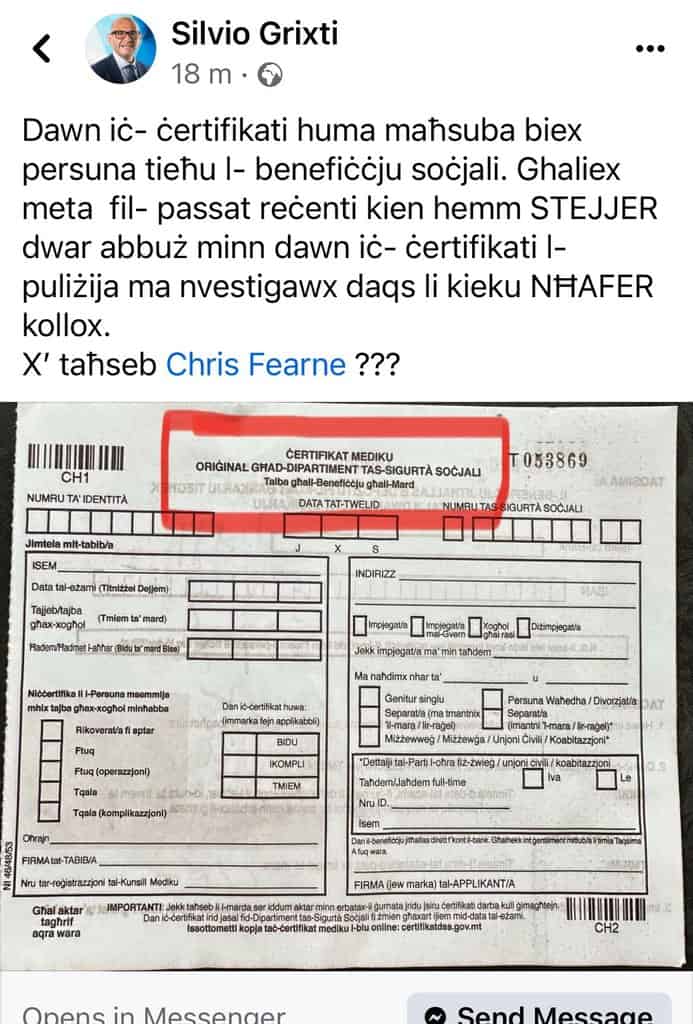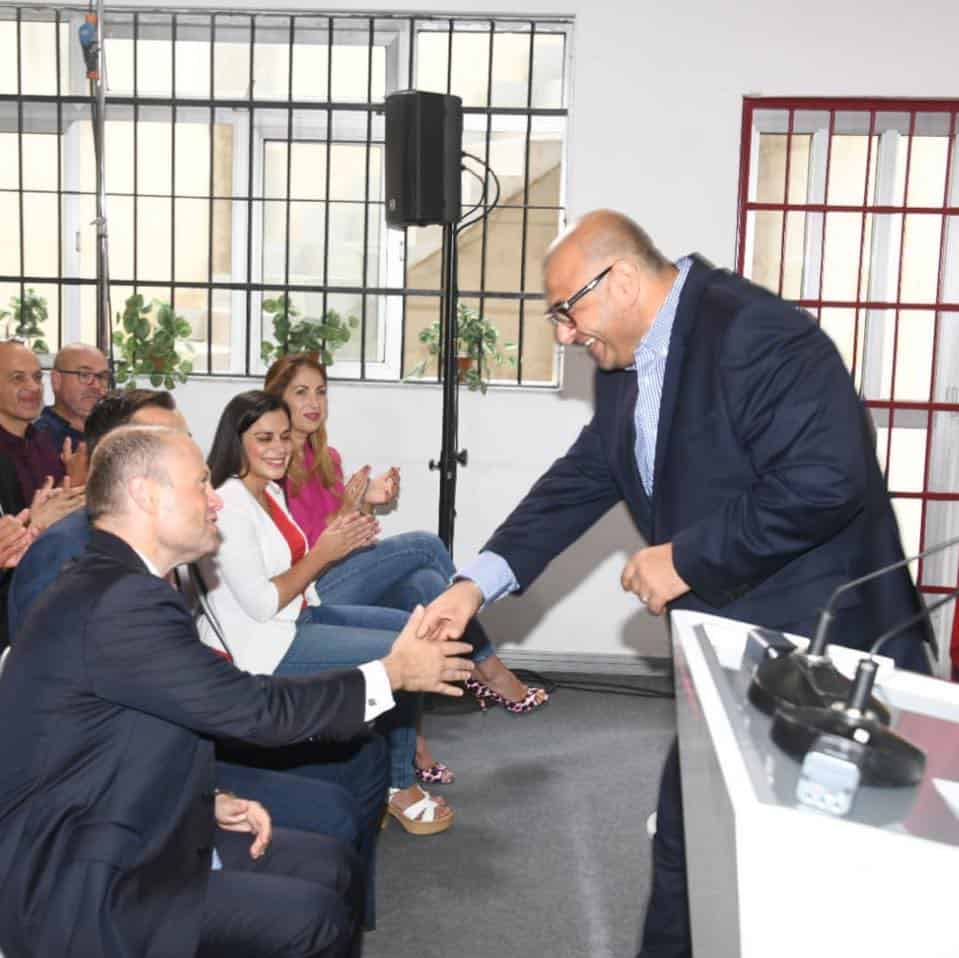
Silvio Grixti came out of his cave yesterday. He sent a pointed rhetorical question addressed to Deputy Prime Minister Chris Fearne. Why weren’t publicly known allegations of medical certificates fraud not investigated by the police, he asked?
The press tried to reach the disgraced former Labour backbencher to get out of him details about the allegations he was referring to. Since he remained in hiding, they speculated he was referring to the only case that the press knows about. The allegations were about PN MP and health shadow minister Stephen Spiteri. He was investigated by the medical council for churning out sick leave notes without seeing the certified patients. The case against him was crushed by a constitutional court decision that said the board did not give him a fair hearing. (Read this again about the inadequacy of administrative tribunals).
Silvio Grixti did not elaborate but his logic, such as it is, is transparent. A medical certificate falsely confirming someone is unfit for work is benefit fraud. The state pays for sick leave to which the beneficiary is not entitled. Why is this fraud being treated differently to the case he, Grixti, is alleged to be involved in?
One could point out to Silvio Grixti that merely on the ladder of scale, the fraud he perpetrated to help people get a monthly stipend for falsely claiming they are severely disabled is far more expensive for its victims (taxpayers) then the consequential public cost of undeserved sick leave notes. But doing that would sound like a justification for false sick leave certificates.
I don’t think the point here is to be weighing degrees of guilt and severity of culpability. I think what matters is that Silvio Grixti is arguing that law enforcement is inherently unfair because it is selective. It is not blind to the identity of the perpetrator. The police will charge someone but will ignore the evidence that ought to make a case against somebody else.
Significantly, Silvio Grixti did not address his complaint to the law enforcement agency he implicitly claims is discriminating against him. He didn’t address and tag Angelo Gafà to complain that the police closed their eyes on another case of benefits fraud.
He addressed the complaint to Chris Fearne, and he did so with a tone of sarcasm that leaves no doubt that Silvio Grixti believes Chris Fearne to be at least in part responsible for the discrimination he believes he is suffering at the hands of the police. This is very significant. Silvio Grixti thinks that the police will investigate and act on benefits fraud depending on whether Chris Fearne would want them to.
Perhaps Silvio Grixti thinks that Chris Fearne would want him out of the way. In 2017, the two competed for votes in the third electoral district. By 2022, Silvio Grixti was out of the political picture having been forced to resign his seat as an MP when the benefits fraud scandal was out. Perhaps Silvio Grixti thinks he’s the subject of a criminal investigation because he was an electoral threat to his nearest political rival: the other popular medical doctor running for the same constituency seat.
Perhaps Silvio Grixti thinks that Chris Fearne would want to preserve Stephen Spiteri as his shadow. Stephen Spiteri is largely ineffectual, a bit of an admirer of Chris Fearne, compromised in ways that go beyond the allegation that he issued certificates to patients he did not see. What better ways to preserve your influence as a government minister if your opposite number is a blabbering fan dispossessed of the key to the vault where their many embarrassing secrets are barely hidden?
Whatever motives Silvio Grixti might believe Chris Fearne to have to want Silvio Grixti in trouble with the law and Stephen Spiteri free of it, what really matters here is that Silvio Grixti believes Chris Fearne is able to influence the process to secure the political outcome he most desires.
This is, I suppose, what we have been saying all along. The police are captured by the political interests of the ruling party, and they will only act on crimes committed by people with access to political influence if doing so serves the interests of the ruling party. Silvio Grixti is complaining about the impunity enjoyed by political criminals, about the unequal enforcement of the law, and about the political control of the judicial system. He could be speaking at a Repubblika rally.
But Silvio Grixti is no Repubblika fanboy. His is the reading of a former Labour Party MP and consultant to Robert Abela. He was made consultant to Robert Abela after he was forced to resign as an MP. Now that Silvio Grixti openly disses Chris Fearne, there’s good reason to believe there has been a power struggle. When Chris Fearne first heard of the benefit fraud perpetrated by Silvio Grixti, he would have pushed for Grixti’s resignation. Robert Abela pushed against, attempted, and failed to protect Grixti, and consoled Grixti with a better paid job at the prime minister’s office.
I should be clear. I am speculating here on the back of Silvio Grixti’s Facebook post, too often vaguely described as cryptic. It’s not merely cryptic. It’s damaging and it is damaging by design.
For you see, Silvio Grixti doesn’t give a flying if Stephen Spiteri is prosecuted. He is not keen on an equal application of the law because he wants people who are also responsible for the sort of thing he is accused of to face justice. Rather than the equal application of the law, he wants the law’s equal disregard. He wants to be let off like, he seems to be suggesting, Stephen Spiteri has been.
He is indignant because the omertà that practically protects them all has dropped the ball in his case. And he wants the security and comfort and impunity of omertà back. He wants the police to stay away from him and he warns that if they don’t, he will rock the political boat. He wants to remind anyone with half a mind to prosecute him that the interests of the Labour Party are best served by leaving him alone.
If this is familiar it is because you’ve seen it all before. The Silvio Grixti-Chris Fearne dynamic is a miniature version of the Joseph Muscat-Robert Abela dynamic. Joseph Muscat, who is in a very good position to know, expects Robert Abela is perfectly capable of guaranteeing his immunity. Muscat periodically reminds Abela what he could do if Abela lets the police get anywhere near Muscat.
They are pointing guns at each other’s heads, but it is the rest of us who are being held hostage.
